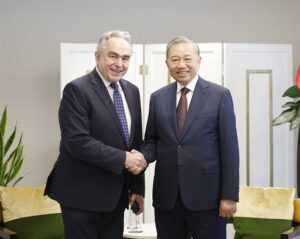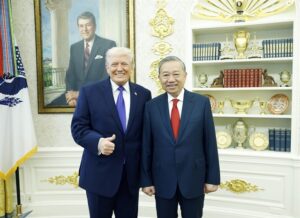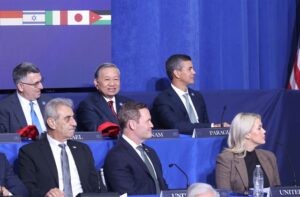Việt Nam Poised for Deep Integration into Global Semiconductor Industry, Says Deputy PM

Hà Nội, The Gulf Observer: Deputy Prime Minister Trần Hồng Hà emphasized Việt Nam’s significant opportunities to integrate deeply into the global semiconductor industry during the 15th National Assembly’s 7th sitting. Addressing pressing issues in the semiconductor sector, Deputy PM Hà underscored the necessity for fundamental changes and specialized research programs to master technology, production, and manufacturing in the long term.
In response to Deputy Nguyễn Thị Việt Nga from Hải Dương Province, Deputy PM Hà noted that numerous leading global companies in information technology and the digital economy have already established a presence in Việt Nam. To fully integrate into the semiconductor value chain, immediate and continuous training of engineers is essential. These engineers must possess a deep understanding of the sector and engage in design, packaging, and testing within the semiconductor industry.
Việt Nam benefits from a large overseas workforce, including Vietnamese individuals experienced in the semiconductor field. With appropriate policies, the participation of overseas Vietnamese experts and scientists can be mobilized. The Government plans to support businesses in selecting universities to establish semiconductor technology centers and invest in advanced laboratories for design, production, and testing.
Deputy PM Hà highlighted the challenges posed by the monopoly of semiconductor chip design and manufacturing equipment by a few countries. He stressed the need for both basic and in-depth research to achieve long-term mastery. “It is necessary to attract electronics companies producing items that use semiconductor chips, aiming to build a high-tech electronics industry and to train comprehensively in other basic scientific fields,” he said.
During the session, Deputy Tạ Văn Hạ from Quảng Nam Province inquired about policies to attract investors and leverage the country’s potential resources. Deputy PM Hà confirmed that a plan for immediate and continuous training based on the existing workforce is in place. Universities are already preparing students for participation in the semiconductor industry. However, mastering all stages and fully integrating into the value chain remains a significant challenge.
The Government has directed investments in several science and technology centers for shared research use by schools and innovation centers to develop initial basic research and master subsequent steps. These investments are substantial, particularly in pilot production, which can amount to $7 billion. Therefore, both the State and businesses need to participate, he noted.
Addressing Deputy Mai Thị Phương Hoa from Nam Định Province on controlling inflation, Deputy PM Hà explained that Việt Nam’s open economy, with its dependence on imported materials and resources, makes it susceptible to global market fluctuations. The Government has directed ministries to implement solutions ensuring the supply, circulation, and distribution of goods, especially those under State price management. Emphasizing the close relationship between fiscal and monetary policies, he noted that recent measures to manage gold price fluctuations have stabilized the currency’s value. The Government has also promoted policies to stimulate consumption, tourism, and increased public sector investment to balance economic growth and inflation control.
Responding to Deputy Trần Nhật Minh from Nghệ An Province on ensuring electricity for production, Deputy PM Hà detailed the Government’s efforts to implement power source projects, resolve investment issues in stalled projects, and expedite the construction of the 500 kV transmission line (circuit 3). The diversification of power sources and the establishment of direct power purchase agreements for renewable energy are also underway, alongside encouraging rooftop solar panel installations for self-consumption.
Regarding administrative procedure reform, raised by Deputy Trần Văn Minh from Quảng Bình Province, Deputy PM Hà stated that the Government prioritizes streamlining regulatory agencies and reducing intermediary bodies to cut administrative procedures. This includes integrating multiple procedures into a single system, accelerating the application of information technology, developing national databases, and providing direct public services.
In his concluding remarks after the two and a half-day session, NA Chairman Trần Thanh Mẫn commended the active participation of deputies and urged those who did not get a chance to speak to continue sending their questions in written form to the Prime Minister, Government members, and sector leaders.
This session of the National Assembly has set a clear path for Việt Nam’s advancement in the semiconductor industry and broader economic stability and growth.


